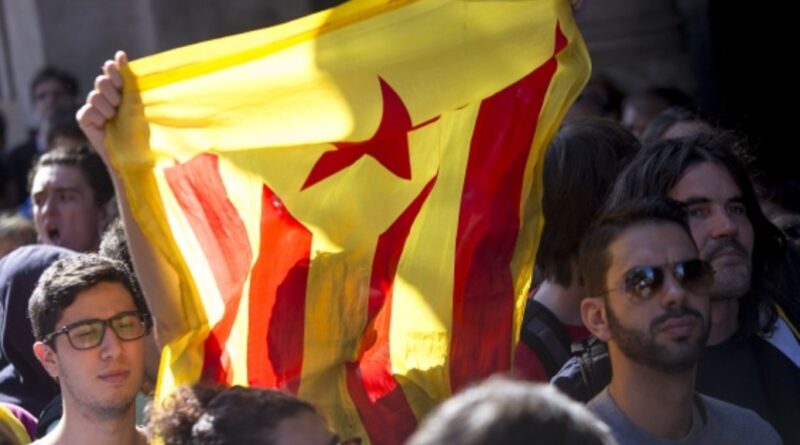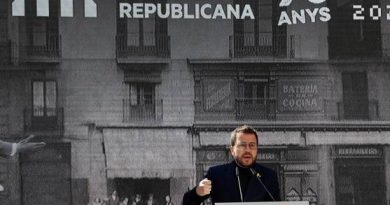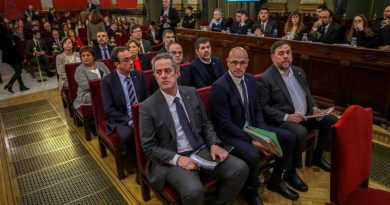The CUP at a crossroads
The fraternal and democratic exchange of opinions is essential to choose the best path to follow.. The controversial tactics are not alien to the strategic ones for the advancement of self-determination and socialism from a socialist and revolutionary perspective..
Saturday 16 from December, in the Palau Feral de Girona, The CUP held the “Open National Congress” as a starting point for the Garbí process for its “refoundation”. It was an open instance to which they were accredited 650 participants for the presentation of the “Document for Debate” prepared by the leadership. The items were addressed in different blocks.: Situation analysis, Internal and retrospective analysis and Bases for an independence and socialist strategy in the Catalan Countries. In each block there were reports and a round of brief interventions, no final votes. The event closed with a ceremony. The debates with the militancy that take place in the Territorial Assemblies will culminate in a National Assembly scheduled for the month of June.
An unavoidable dilemma
Obviously, The debates addressed by the CUP have particular characteristics related to the historical and conjunctural process in Catalonia. Nevertheless, They also have points of contact with the debates that cross “the left” worldwide., with tactical and strategic controversies in which the dilemma of reform or revolution is raised as an unavoidable reference.
Contributions to the debate
As activists of Socialism and Freedom (SOL), we share struggles, activities and we integrate municipal lists of the CUP; in a fraternal and open relationship with colleagues; without leaving aside the differences, nuances and reviews. From this location we address some opinions already outlined on other occasions., with the intention that they be a contribution, even if it's modest, to the ongoing debate. We start from agreeing that: the capitalist crisis continues, deterioration of the standard of living of the working class, the struggles will be accentuated, a democratically planned economy and the Catalan Republic are necessary, socialist, feminist and ecologist. From here the differences and nuances that we have been pointing out for a long time arise..
Crossroad
The CUP has regressed politically and organizationally to such a point that the “refoundation”. The contradictions it carries have put it at a crossroads: adopt an openly reformist course or turn to the left and revolution. This is the same dilemma that they faced at the time., for example, Syriza, Die Linke and Podemos. Regrettably, These organizations responded to the dilemma by choosing the worst reformist path.: smooth out rebellious edges and adapt to the institutions of bourgeois democracy. We believe it is necessary to approach the debate in these terms, Because not doing so would imply not giving a fundamental answer to the real problem..
Get away from the “camp”
The hegemonic imperialist bloc NATO, OF. THE. and EU plays a plundering role, oppression and warmongering around the world; They are a powerful enemy to defeat. at the same time, China and Russia dispute political hegemony, economic and military from projects that have nothing progressive. Do not explicitly reject the new imperialisms, despite not being the traditionally prevailing, leads to wrong positions, how not to show solidarity with the people who confront them and to be complicit in new imperialist projects of plunder with the excuse of "Lesser evil".
Growing political and social polarization
The relative strengthening of the state government, the defeat of “transformative processes”, the disorientation of the independence movement and the rise of the right and the extreme right show one side of reality, but not the only one. There is also growing political and social polarization, There are symptoms of recomposition of the labor movement that is expressed in the struggles in Germany, France, Italy, United Kingdom and in the countless protest actions in Spain, Catalonia and the EU. The mobilizations for Palestine also reflect the growing spirit of popular struggle and that of port workers in several countries.. Expressions against the extreme right are also growing, like the great mobilizations carried out in Germany. A partial analysis, with tinges of skepticism, leads to underestimation of ongoing conflicts and makes it difficult to take advantage of union and political opportunities.
An oxygenated regime, but not all powerful
The monarchical-parliamentary regime has achieved a partial respite, but has not been able to reverse his crisis, nor extinguish the will of broad Catalan popular sectors in favor of independence. The oxygen he obtained does not come from his vitality but from the artificial respirator provided by the traitorous political and union leaderships.. The government has an uncertain future, the monarchy is questioned, The bourgeois parties dispute divided and justice is discredited. The '78 regime designed by the Franco regime is so anachronistic that it cannot offer progressive changes to society.
The problem is in the majority pipelines
In Catalonia there is an ebb of mobilization, confusion of activism and weakening of the independence movement due to the surrender of ERC and Junts, that set the course towards autonomism and the pacts for the investiture of Sánchez. They negotiate with the PSOE, that only differs from the PP in the tactics of using repression and 155, since they agree on the strategy of maintaining the unity of Spain and liquidating self-determination. The problem is not in the popular mobilization but in the politics of the majority leaderships that stop and/or divert them.. In this regard, alignment with bourgeois expressions, whether Spanish or Catalan, weakens the reference in the working class. It is essential to build a new revolutionary and consistent leadership with decisive influence among the masses.
“Dialogue” is a trap
ERC and Junts are the cultivators of "dialogue" with the new government of Pedro Sánchez what, as they claim, allows to achieve “small steps forward” towards the Catalan Republic, but, In reality, they immerse the independence movement in the institutional traps of the oppressors. This is not new, as partners in the Government they missed a historic opportunity when they declared independence and suspended it a few seconds later, with the people mobilized demanding the self-determination voted in the 1-O Referendum. They did it to seek a negotiation with Mariano Rajoy who responded with the 155, the repression and intervention of Catalan institutions. As long as these expressions of the Catalan bourgeoisie are the majority in the leadership, They will be a brake on the breakup, independence and socialism. The CUP agreements with ERC and the investiture support went in the opposite direction to forming an independent option.
Municipalism and national politics
Municipalism brings the CUP closer to territorial movements and is an achievement, but it must overcome the contradiction of enabling policies place by place, making alliances even with bourgeois organizations or organizations headed by reformists. Currently, municipalism has so much weight that it weakens the monitoring and response to the major problems of working people with the application of a unified national policy.. The challenge is to connect local politics with national politics, contributing from each town and city to national construction in the same direction while responding to local problems.
From an electoral organization to a fighting organization
The current structure has the characteristics of an electoral organization, not of an organization to intervene in the class struggle, It is something urgent to change to orient ourselves towards the labor movement and its struggles. An organization is needed that goes beyond the electoral, that is more democratic and improves the relationship between the base and the leadership, that incorporates workers and students, that has as a priority supporting and intervening in struggles with a unified policy.
Some political proposals, orientation and organization
As a contribution, We point out some of the opinions and proposals that we consider essential for an anti-capitalist organization, leftist and revolutionary.
– The balance of the CUP intervention during the process and 1st October, is still under debate. Beyond it, It is a fact that neither at that time nor now does the CUP appear as a mass alternative in the face of the surrender of Junts and ERC., that the PSC has capitalized electorally. In our opinion, This is due to the lack of a clear internal strategy and a forceful delimitation of the politics of the majority parties., issue that is urgent to reverse.
-Pose a clear anti-capitalist and socialist profile, feminist, ecologist, in defense of immigrants and anti-fascist. Differentiate yourself at every ERC moment, JxCat and the reformists since class independence. Be the most consistent opponents in the Sánchez government, the '78 regime, the capitalist system and the Aragonés Government. Support a radical policy for complete amnesty, the break with the State and the defense of the Catalan language and culture. Do not support investitures, bourgeois governments and budgets. Centrally, boost mobilization, the general strike and democratic self-organization outside the institutions. Provide a transitional program that builds a bridge between the immediate needs of the masses and the strategic solution by the workers' government.. The socialist solution must be permanently considered without contrasting it with self-determination, They are a fundamental part of a permanent political and ideological dispute that cannot be separated by stages..
-Prioritize intervening and concentrating the CUP in the most dynamic sectors of the labor movement, with the criterion of supporting the struggles and joining the vanguard.
-Get involved and support feminist claims, environmentalists, student, for full rights for immigrants, for housing and the ongoing mobilization for Palestine. Carry out street agitation campaigns in the face of each important fact of political reality and class struggle, not just for elections. The center of daily intervention must be popular struggles, in the seats the orientation must be the traditional one of Leninism, revolutionary and not reformist, at full disposal of the struggles in the street since we do not occupy positions to improve bourgeois institutions.
– It is essential to guarantee the class independence of the party that participation in the institution and intervention in struggles are organically connected.. It is necessary that the people who occupy positions in institutional politics be cadres of the class struggle, the struggles of “the street”, that they are organic militants and not personalities without affiliation to the political project. It is also necessary to find a balanced formula between rotation and permanence of candidates so that they can be installed as leading figures over time..
– Strengthen the democratic pole of internal functioning, with a weekly back and forth debate between the assemblies and the national leadership, consulting the militants and working as a team with the militancy to avoid the loss and permanent rotation of militants and the general waste of forces, also avoiding the bureaucratization of meetings and debate.
-Rediscuss the militant criteria, among which the minimum requirement would be to participate in party meetings, carry out activities regularly and contribute financially to the organization.
– Provide the organization with cadres in Marxism and nominate new comrades to continue growing, who are willing to give their time or part of it to militancy, taking militancy beyond partial dedication. It is necessary to combine grassroots militancy with professional militants entirely at the service of politics and the construction of the party to guarantee the execution of political bets.. To do this, it is necessary for the party to finance itself through fees., special campaigns and without depending on the institutions.
-Strengthen internationalism by debating in local assemblies and carrying out international campaigns.




